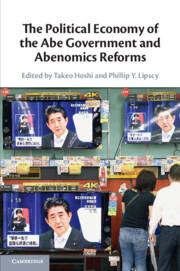Book contents
- The Political Economy of the Abe Government and Abenomics Reforms
- The Political Economy of the Abe Government and Abenomics Reforms
- Copyright page
- Dedication
- Contents
- Figures
- Tables
- Contributors
- Acknowledgments
- Abbreviations
- Part I Introduction
- Part II Political Context
- 2 Expansion of the Japanese Prime Minister’s Power and Transformation of Japanese Politics
- 3 Why Does the Abe Government’s Approval Rating Always Recover?
- 4 The LDP under Abe
- 5 The Third Arrow of Abenomics: Est. in 2013 – or 2007?
- Part III Macroeconomic Policy
- Part IV Third Arrow of Abenomics
- Part V Foreign Policy
- Index
- References
3 - Why Does the Abe Government’s Approval Rating Always Recover?
from Part II - Political Context
Published online by Cambridge University Press: 05 February 2021
- The Political Economy of the Abe Government and Abenomics Reforms
- The Political Economy of the Abe Government and Abenomics Reforms
- Copyright page
- Dedication
- Contents
- Figures
- Tables
- Contributors
- Acknowledgments
- Abbreviations
- Part I Introduction
- Part II Political Context
- 2 Expansion of the Japanese Prime Minister’s Power and Transformation of Japanese Politics
- 3 Why Does the Abe Government’s Approval Rating Always Recover?
- 4 The LDP under Abe
- 5 The Third Arrow of Abenomics: Est. in 2013 – or 2007?
- Part III Macroeconomic Policy
- Part IV Third Arrow of Abenomics
- Part V Foreign Policy
- Index
- References
Summary
One of the most noteworthy facts about the government of Shinzo Abe is that, although his cabinet approval rating often dropped dramatically following controversial political decisions, it typically bounced back. In this chapter, I analyze Abe’s resurgent popularity based on a survey experiment which I conducted in late 2015 soon after the passage of national security legislation had caused the public support for his government to sink at its lowest level. The experiment successfully recaptured the occurrence of drops in the support for Abe government when respondents were primed informationally about the national security bill just passed. Further, cross-sectional analyses reveal that the drops occurred not amongst liberal/leftist respondents but rather among conservative respondents reacting perhaps to Abe’s overly aggressive manner in the legislative process. Precisely because their policy positions were closest to Abe himself, their withholding of support would not last long, thus elucidating the reason for Abe’s resurgent popularity.
Keywords
- Type
- Chapter
- Information
- Publisher: Cambridge University PressPrint publication year: 2021
References
- 2
- Cited by

